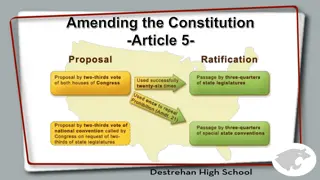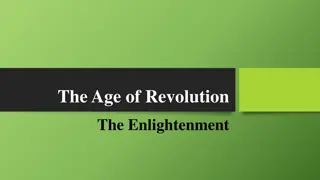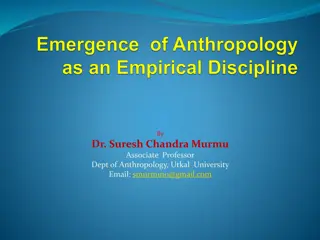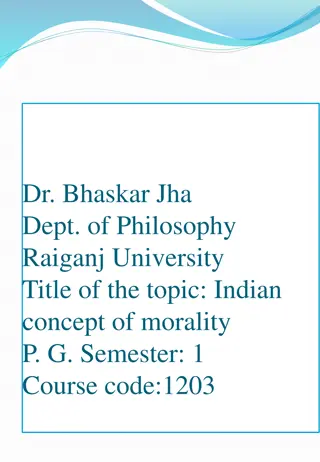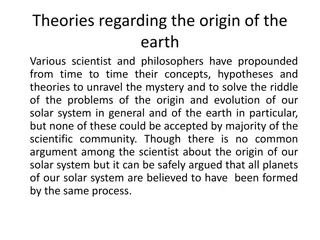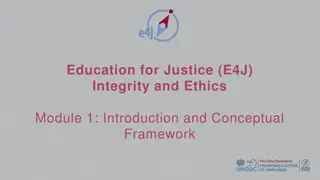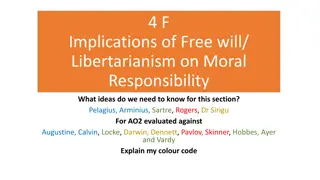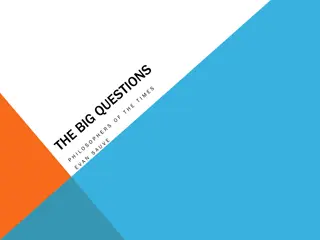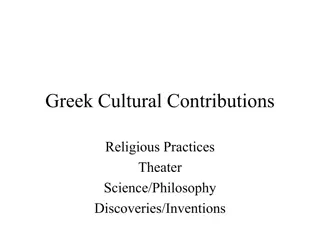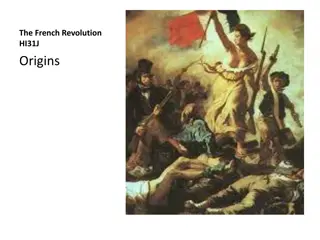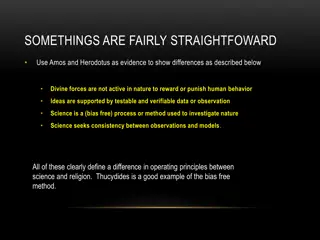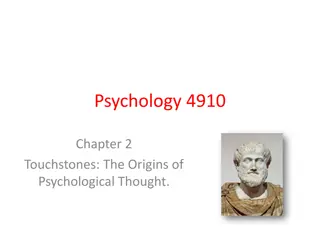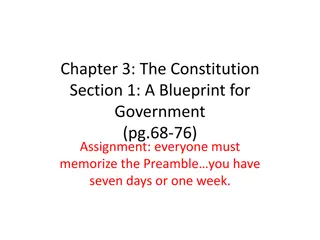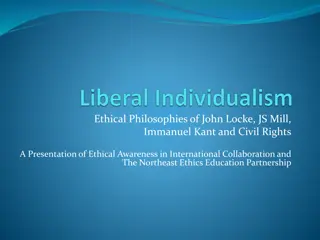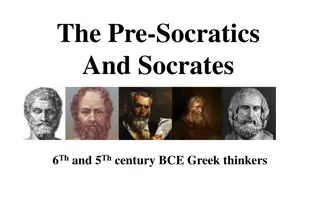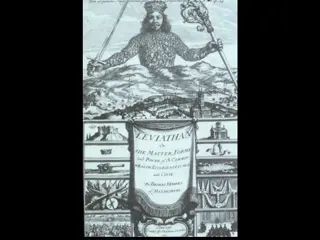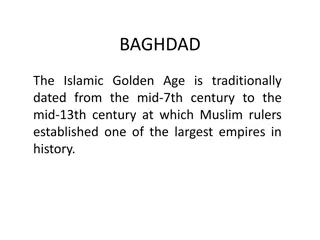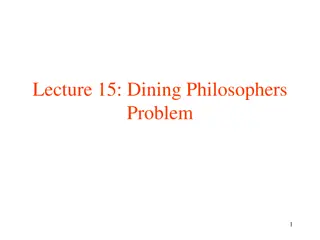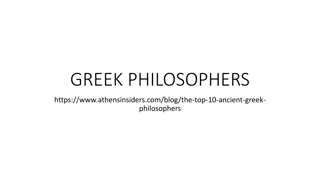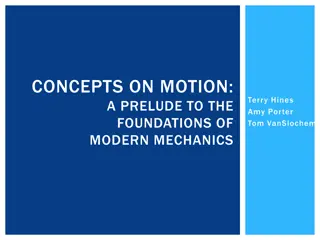Austen in Theory
The housekeeping information for the Austen in Theory course, including paper deadlines and prompt details. Students will explore Austen's novels in relation to philosophers such as Locke, Hume, Smith, Burke, or Wollstonecraft.
1 views • 28 slides
Your Guide to Getting a German Study Visa in Hyderabad
Germany, the land of Mar, Nietzsche, and various thinkers and philosophers. The land of eye-catching Volkswagen, ravishing automobiles of Audi, Porsche, Mercedes among multiple others. A land blessed with diverse culture and history. Germany is one of the top sought countries for undergraduate and p
0 views • 3 slides
Evolution of Psychiatry: A Historical Journey through Time
Psychiatry, a field blending clinical practice, biology, and social sciences, has ancient roots dating back to Graeco-Roman philosophers like Plato and Hippocrates. Significant historical milestones include the body humor hypothesis, the first mental health ward, and the emergence of psychiatric asy
2 views • 49 slides
Perspectives on Reality: Idealism vs. Materialism in Philosophy
Philosophy delves into fundamental questions about existence and reality. This lecture explores contrasting viewpoints of idealism, which posits that reality is mental, and materialism, which argues reality is physical. Examples from philosophers like George Berkeley and Karl Marx exemplify these pe
2 views • 12 slides
Liberty & The Age of Enlightenment The American Battlefield Trust
The Age of Enlightenment, with its emphasis on natural law, liberty, progress, and constitutional government, greatly influenced American thinking and the Revolutionary War. Key figures like John Locke and Sir William Blackstone contributed ideas of social contract and law that shaped American gover
2 views • 15 slides
Evolution of Cosmic Understanding: From Flat Earth to Heliocentrism
Over millennia, human perception of the universe has transformed from viewing the sky as a dome above a flat Earth to accepting the heliocentric model proposed by Copernicus. Ancient beliefs, such as the Hebrew view of the universe, gave way to Greek philosophers' spherical Earth theory and the even
7 views • 67 slides
Origins of Government Power in the United States
The U.S. government derives its power from the consent of the governed, reflecting principles of popular sovereignty, general will, and majority rule. Philosophers like Hobbes, Locke, and Rousseau have influenced the concept of government's legitimacy through the consent of the people. The evolution
0 views • 13 slides
Enlightenment Thinkers and Their Ideals
The Age of Revolution was marked by influential Enlightenment thinkers such as Thomas Hobbes, John Locke, Montesquieu, and Jean-Jacques Rousseau. These philosophers explored human nature, government, and society, shaping modern political thought. Hobbes emphasized a pessimistic view, advocating for
2 views • 9 slides
Evolution of Anthropology: From Herodotus to Modern Times
Anthropology has evolved over centuries, with roots tracing back to ancient Greeks like Herodotus. The discipline developed into a scientific field during the European Enlightenment and has since progressed to study the science of humanity and cultural differences. Philosophers like Plato and Aristo
2 views • 40 slides
Indian Concept of Morality in Philosophy
Delve into the intricate discussions surrounding morality in Indian philosophy, exploring the distinctions made between what is and what ought to be. Compare Western and Indian perspectives on morality and examine key criteria proposed by philosophers like Kurt Baier and Frankena. Discover how India
4 views • 20 slides
Theories on the Origin of Earth and Solar System
Scientists and philosophers have proposed various theories regarding the origin of Earth and our solar system, with concepts ranging from evolutionary to catastrophic. The Dust gas cloud theory, Planetesimal hypothesis, Binary star hypothesis, and more have been suggested to explain how planets were
4 views • 7 slides
Ethics and Integrity Module Overview
This module provides an in-depth exploration of integrity and ethics, covering conceptual frameworks, ethical theories, major philosophers, and practical applications through exercises and discussions. Students will develop an understanding of integrity, ethical dilemmas, and personal values in this
1 views • 11 slides
Analytic Versus Continental Philosophy in the 20th Century: A Comparative Overview
In 20th-century philosophy, the divide between Analytic and Continental schools deepened but has seen recent attempts at reconciliation. Analytic philosophy emphasizes logic, language, and epistemology, requiring technical expertise, while Continental philosophy rejects metaphysical speculation and
0 views • 15 slides
Moral Responsibility and Free Will Implications in a Contemporary Context
This text delves into the implications of free will and libertarianism on moral responsibility, examining the ideas of various philosophers and thinkers such as Pelagius, Arminius, Sartre, and more. It explores the concepts of moral agency, determinism, normative ethics, religious beliefs, and the c
5 views • 12 slides
Influential Philosophers Through Time
Influential philosophers from different periods in history, such as Confucius from ancient China, Socrates and Plato from ancient Greece, Aristotle, Paul of Tarsus, René Descartes, and John Locke. These thinkers contributed groundbreaking ideas to philosophy and society, shaping the way we understa
0 views • 10 slides
Greek Cultural Contributions: From Olympics to Theater
Ancient Greek civilization made significant cultural contributions in various aspects such as religious practices, theater, and scientific discoveries. The Greeks had a rich tradition of honoring their gods through events like the Olympics and theatrical performances that continue to fascinate audie
4 views • 26 slides
Evolution of Applied Ethics in Philosophy
Philosophy, known as the love for wisdom, involves seeking fundamental truths about existence and relationships. In the 1960s and 70s, a shift towards applied ethics emerged as philosophers like Peter Singer emphasized making philosophical discourse accessible to laypersons. This shift was met with
1 views • 12 slides
The Evolution of Naturalist Thinking in Classical Western Thought
The Naturalist Movement marked a shift in Greek philosophy towards rational study of the natural and moral order, departing from mythological explanations. Philosophers like Aristotle emphasized rational investigation over mythological beliefs, identifying nature with matter. They sought to discern
0 views • 10 slides
Reflections on Death and Existence: A Philosophical Perspective
Philosophers have long debated the concept of death, considering it as a propitious misfortune or an inevitable end that deprives individuals of future experiences. Whether viewed as a divine decree or a statistical marvel, the existence of human life adds complexity to the evaluation of death's inh
0 views • 16 slides
Enlightenment Philosophers and Their Influence on the French Revolution
The French Revolution was influenced by Enlightenment philosophers like Thomas Hobbes, Rousseau, Voltaire, and Montesquieu. Their ideas on social contracts, collective sovereignty, enlightened absolutism, and the need for checks and balances challenged the traditional Ancien Régime's feudalism, pri
0 views • 26 slides
Al-Farabi: Influential Medieval Philosopher and His Ideal City Concept
Al-Farabi, influenced by Plato and Aristotle, was known as the Second Aristotle. His works spanned various fields like logic, math, medicine, music, politics, and ethics. He proposed a philosophy involving God as a beginning, being in the middle, and happiness as the end. Al-Farabi delved into the c
0 views • 5 slides
Contrasting Science and Religion Through Ancient Philosophers
The content explores the differences between science and religion using examples from ancient philosophers like Amos, Herodotus, and Epicurus. It highlights how science relies on testable data and unbiased processes, while religion involves divine forces and unverifiable beliefs. The text emphasizes
0 views • 5 slides
Government Review Questions and Answers
Explore essential concepts in government through a series of questions and answers covering topics such as federalism, amendments, due process, influential philosophers, and historical events like the Massachusetts rebellion post-Revolutionary War.
0 views • 20 slides
Origins of Psychological Thought: Ancient Wisdom and Modern Insights
Explore the foundational concepts of psychology by delving into the ancient wisdom of Greek philosophers like Pythagoras and Plato, as well as Eastern perspectives from Lao-tzu and the I Ching. Discover how these early ideas shaped modern psychological thought and the understanding of human behavior
0 views • 14 slides
Enhancing Integrity in Water Services Trust Fund for Improved Access to Water and Sanitation
Explore the importance of integrity and ethics in the Water Services Trust Fund for enhancing access to water and sanitation. Delve into concepts of integrity, ethics, and the detrimental effects of corruption. Learn from historical philosophers on virtue and wisdom and how they relate to ethical co
0 views • 13 slides
The Blueprint for Government: Goals and Principles of the Constitution
The content delves into the foundation of the U.S. Constitution, highlighting the goals and principles behind its creation. It discusses the Framers' intent to prevent government tyranny, drawing inspiration from historical civilizations and philosophers. Exploring the Preamble, it outlines the six
0 views • 12 slides
Ethical Philosophies of John Locke, JS Mill, Immanuel Kant, and Civil Rights
This presentation explores the ethical philosophies of John Locke, JS Mill, and Immanuel Kant, focusing on individual rights, moral autonomy, and the principles of classical liberalism. It discusses the influence of these philosophers on research ethics, emphasizing the protection of individual huma
0 views • 48 slides
Early Greek Philosophers: Pre-Socratics and Socrates
Ancient Greek thinkers like Thales of Miletus laid the foundation for Western philosophy by moving beyond mythology to explore the principles of the natural world. Socrates, a pivotal figure, introduced new ways of thought. This era marked a shift towards critical thinking and rational inquiry, shap
0 views • 42 slides
Insights into the Enlightenment Thinkers: Philosophers of Change
The Enlightenment era marked a shift towards reason and enlightenment, with thinkers like Locke, Hobbes, Montesquieu, Rousseau, and Voltaire advocating for progress, natural law, and individual rights. Each philosopher contributed unique ideas to reshape societal structures, challenging traditional
0 views • 18 slides
Baghdad - The Islamic Golden Age and Its Cultural Legacy
Baghdad, during the Islamic Golden Age, was a center of culture, knowledge, and innovation. It was home to scholars, artists, poets, and philosophers who made significant contributions to various fields. The city's cultural richness and intellectual vibrancy played a crucial role in shaping the Isla
0 views • 20 slides
Dining Philosophers Problem and Mutual Exclusion Solutions Review
This lecture discusses the Dining Philosophers Problem, a classic synchronization issue in computer science. It covers various solutions for achieving mutual exclusion, including software-based solutions like Peterson's algorithm and hardware-based solutions like Test-and-Set (TSL/XCHG). Additionall
0 views • 17 slides
Ancient Greek Philosophers and Their Revolutionary Ideas
Explore the influential ancient Greek philosophers like Anaxagoras and Pythagoras, who delved into topics like the interconnectedness of all things and the fundamental essence of the universe. These thinkers laid the groundwork for modern philosophy and mathematics with their unique perspectives and
0 views • 19 slides
Philosophers' Views on Religious Experience: Insights and Critiques
This lesson delves into the perspectives of various philosophers such as Rudolph Otto, Richard Swinburne, John Hick, and Michael Persinger on religious experiences. It explores concepts like the numinous, religious knowledge, God's existence, and criticisms on the validity of religious experiences.
0 views • 7 slides
Classical Inter-Process Communication Problems
Classical Inter-Process Communication (IPC) problems such as the Dining Philosophers Problem and the Readers and Writers Problem are explored in-depth by Ali Akbar Mohammadi. The challenges, solutions, and non-solutions to these problems are discussed, shedding light on issues like starvation in con
0 views • 15 slides
Evolution of Motion Theories and Philosophers' Perspectives
Various historical figures like Aristotle, Hipparchus, John Philoponus, Avicenna & Avempace, William of Ockham, and John Buridan contributed to the understanding of motion theories. Concepts such as Impetus Theory and the views of different philosophers provide a rich tapestry of ideas that laid the
0 views • 24 slides
Evolution of Atomic Models: From Ancient Philosophers to Quantum Mechanics
Tracing the evolution of atomic models from the ancient Greek philosophers' concept of indivisible atoms to the groundbreaking discoveries of electrons, protons, and neutrons. The journey through Thomson's Plum Pudding model, Rutherford's planetary model, Bohr's quantized model, and the introduction
0 views • 14 slides
Enlightenment Ideas and Philosophers
Explore key Enlightenment ideas such as equality, freedom of expression, and religious tolerance through the works of prominent philosophers like Voltaire and Rousseau. These concepts challenged traditional beliefs and laid the foundation for modern democratic societies.
0 views • 12 slides
The Structure of the Atom: A Journey from Ancient Philosophers to John Dalton
Explore the evolution of atomic theory from ancient philosophers like Democritus to modern scientist John Dalton. Discover how the concept of atoms transformed over time, leading to the fundamental understanding of matter as indivisible particles. Delve into the contrasting ideas and advancements th
0 views • 11 slides
Modern Theodicy: Early Modern Philosophers and Theodicy Problem
Early modern philosophers like Pierre Bayle, David Hume, Thomas Hobbes, and Gottfried Leibniz grappled with the problem of theodicy, exploring questions of evil, skepticism, and human nature. These thinkers presented diverse perspectives on the relationship between religion, science, and ethics, she
0 views • 10 slides
Modern Theodicy Through Early Modern Philosophers
Wrestling with the problem of evil and theodicy through the perspectives of philosophers like Pierre Bayle, Gottfried Leibniz, Thomas Hobbes, Voltaire, and David Hume. Explore their contrasting views on skepticism, materialism, the existence of evil, and the nature of human life.
0 views • 18 slides






